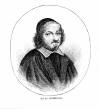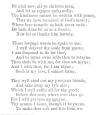|
Miles Coverdale (1486-1568).

Miles Coverdale became an eminent puritan divine
and probably the foremost translator of the Scriptures into English. But like many of his time, was first an Augustinian monk. He was born in Yorkshire in 1486 and educated at Cambridge university, after which he became a monk. He then appears in Tubingen in Germany continuing his studies for a doctorate. Early in Henry VIII`s reign he renounced his popish principles and became a zealous reformer.
The turning point in Coverdale`s life seems to have been a meeting with
Sir Thomas More and Thomas Cromwell in 1527 when More urged him to apply
himself to sacred learning. Coverdale turned to the Scriptures “and
perceived that the reformation of the church must be effected by the Word
of God.”
“Wherever the Scripture
is known it reformeth all things. And Why ? Because it is given by the
inspiration of God.“
This statement encapsulated the shape of
the Reformation in England and gave direction to Coverdale for his
contribution to the education of the people. His zeal at this time was
further reflected in pious songs

At the rejection of papal authority by Henry VIII he was one of the first who publicly preached the protestant gospel; and exhibited further zeal at Brunsted, Essex,
in 1528, when he publicly declared against the mass, worship of images, and auricular confession which he considered altogether useless. Given that Henry had only rejected the papal overlordship, the church itself was still essentially catholic, and Coverdale`s public utterances could hardly go unnoticed. His early success at conversions
in Essex was soon followed by the pursuit of the prelates seeking to send him to the fire,
With the death of his tutor Dr Barnes,
Coverdale felt the necessity of withdrawing from his outward activity
(preaching) and went to Holland for a while. There he met with William Tyndale
through his work – translating the Scriptures, and a powerful union of
minds with a common objective was formed. In 1529 Tyndale had been taking his translation of the Pentateuch to Hamburg for printing but had lost both manuscript and all his possessions in a shipwreck. Meeting up with Coverdale in Hamburg they finished a fresh translation of the whole Bible in English and published it in in 1535
( often called Coverdale`s Bible) . Inevitably the publication caused the prelates to complain to the king who had all copies called in and promised a new translation. Coverdale provided a new translation in 1537
(the Matthew Bible) which was again complained against but this time Henry asked the pertinent question – whether it contained any heresies ? When the prelates said that they found none, Henry ordered that it be released to the people.
With the encouragement of Cranmer and Cromwell, he then undertook a
further revision which became the Great Bible of 1539.
Pursuit by the prelacy again influenced Coverdale to seek safety in Holland, then in Germany where he taught children as a means of subsistence. He managed in between times to learn Dutch and was rewarded by the Elector Palatine by appointment to the benefice of Burghsaber. In his stay here he was assisted financially by his patron, Thomas Cromwell. On the accession of Edward VI (1547-53) he, like many other religious exiles, returned to England where he was appointed to the diocese of Exeter. Cranmer himself performed his consecration at Lambeth Palace. In Exeter Coverdale won many friends by his good example and zeal, constantly preaching and turning his home into an open house cum church where all were welcome. The untimely and early death of Edward Vi however, gave place to the murderous actions of Mary Tudor. The catholic Mary was a great boost to the papists who now had Coverdale, and many others, cast into prison ( intending him for the stake). He was saved by the intervention of the King of Denmark.
Released into exile Coverdale went via Denmark to Westphalia, and then to the Elector of the Rhine who restored him to Burghsaber. During the reign of Mary (1553-8), the exiled ministers in Europe together made another translation of the Bible. The work done by Coverdale, Goodman, Gilby, Whittingham, Samson, Cole, Knox, Badleigh
and Pullman was published as the “Geneva Bible” dedicated to Queen
Elizabeth in 1560. The New Testament had been published in 1557 and was
the first time that there were numerical verses. The full Bible had
marginal notes which offended some and was prohibited by Archbishop Parker
until reprinted with amended notes.
Coverdale returned to England when Elizabeth came to the throne (1558-1603) but declined to return to the bishopric of Exeter. With age and relentless pursuit of the papists beginning to wear him out, Coverdale was given the benefice of St Magnus at Bridgefoot and had to seek charity when he was unable to pay the `first fruits` of over sixty pounds. His supplication was granted; but his stay lasted only two years before he was deemed not to be fully conforming to the `High Church` ritual that Elizabeth liked. He continued to preach where he could and people would enquire at his house on the Saturday to ascertain where he was to preach the next day. But even this drew attention to him and he had to decline such enquiries else he was prevented from preaching altogether. The infirmities of old age eventually caught up with him and he died aged 81 years, on 20 January 1568. His funeral was attended by thousands when he was interred at St Bartholomew`s Church, London.
|